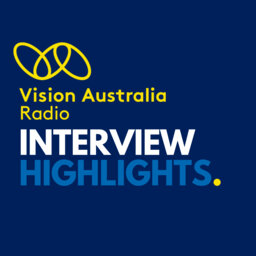Interview Highlight: Caroline Bowditch - Arts Access Victoria
Arts Access Victoria is celebrating 50 years in the disability arts sector, and to celebrate Sam is joined on Talking Vision by CEO Caroline Bowditch.
Caroline talked about how AAV is celebrating the milestone, including a series of events in Melbourne over the month of July coinciding with Disability Pride Month.
In 1 playlist(s)
Interview Highlights from Vision Australia Radio
Vision Australia Radio Interview Highlights shares a range of discussions initially broadcasted on o…Social links
Follow podcast
Recent clips

Totally Lit - Word of Mouth - Home and Hope
50:54

Totally Lit Festival: Alkira - Tony Buti with Gillian O'Shaughnessy
57:34

Interview Highlight: David Tredinnick - Vision Australia
12:39
 Interview Highlights from Vision Australia Radio
Interview Highlights from Vision Australia Radio